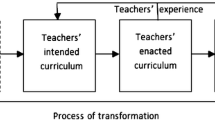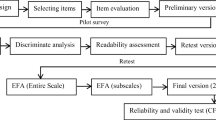Abstract
There is broad acceptance that mathematics teachers’ beliefs about the nature of mathematics influence the ways in which they teach the subject. It is also recognised that mathematics as practised in typical school classrooms is different from the mathematical activity of mathematicians. This paper presents case studies of two secondary mathematics teachers, one experienced and the other relatively new to teaching, and considers their beliefs about the nature of mathematics, as a discipline and as a school subject. Possible origins and future developments of the structures of their belief systems are discussed along with implications of such structures for their practice. It is suggested that beliefs about mathematics can usefully be considered in terms of a matrix that accommodates the possibility of differing views of school mathematics and the discipline.
Similar content being viewed by others
Notes
See Beswick (2011) for a detailed argument for the equivalence of beliefs and knowledge.
References
Ball, D. L. (1990). Breaking with experience in learning to teach mathematics: The role of a preservice methods course. For the Learning of Mathematics, 10(2), 10–16.
Ball, D. L., Thames, M. H., & Phelps, G. (2008). Content knowledge for teaching: What makes it so special? Journal of Teacher Education, 59(5), 389–407.
Beswick, K. (2003). Accounting for the contextual nature of teachers' beliefs in considering their relationship to practice. In L. Bragg, C. Campbell, G. Herbert, & J. Mousley (Eds.), Mathematics education research: Innovation, networking, opportunity: Proceedings of the 26th annual conference of the Mathematics Education Research Group of Australasia (Vol. 1, pp. 152–159). Melbourne: Deakin University.
Beswick, K. (2004). The impact of teachers' perceptions of student characteristics on the enactment of their beliefs. In M. J. Hoines & A. B. Fuglestad (Eds.), Proceedings of the 28th annual conference of the International Group for the Psychology of Mathematics Education (Vol. 2, pp. 111–118). Bergen: Bergen University College.
Beswick, K. (2005). The beliefs/practice connection in broadly defined contexts. Mathematics Education Research Journal, 17(2), 39–68.
Beswick, K. (2007). Teachers' beliefs that matter in secondary mathematics classrooms. Educational Studies in Mathematics, 65(1), 95–120.
Beswick, K. (2009). School mathematics and mathematicians’ mathematics: Teachers’ beliefs about the nature of mathematics. In M. Tzekaki, M. Kaldrimidou, & H. Sakonidis (Eds.), Proceedings of the 33 rd annual conference of the International Group for the Psychology of Mathematics Education (Vol. 2, pp. 153–160). Thessaloniki, Greece: IGPME.
Beswick, K. (2011). Knowledge/beliefs and their relationship to emotion. In K. Kislenko (Ed.), Current state of research on mathematical beliefs XVI: Proceedings of the MAVI-16 conference June 26–29, 2010 (pp. 43–59). Tallinn, Estonia: Institute of Mathematics and Natural Sciences, Tallinn University.
Burton, L. (2002). Recognising commonalities and reconciling differences in mathematics education. Educational Studies in Mathematics, 50, 157–175.
Callingham, R., & Griffin, P. (2001). Beyond the basics: Improving indigenous students' numeracy. In J. Bobis, B. Perry, & M. Mitchelmore (Eds.), Numeracy and Beyond: Proceedings of the 24th annual conference of the Mathematics Education Research Group of Australasia (Vol. 1, pp. 122–129). Sydney: MERGA.
Cooney, T. J., & Shealy, B. E. (1997). On understanding the structure of teachers' beliefs and their relationship to change. In E. Fennema & B. Nelson (Eds.), Mathematics teachers in transition (pp. 87–109). Mahwah, NJ: Lawrence Erlbaum.
Ernest, P. (1989). The impact of beliefs on the teaching of mathematics. In P. Ernest (Ed.), Mathematics teaching: The state of the art (pp. 249–253). New York: Falmer.
Ernest, P. (1999). Forms of knowledge in mathematics and mathematics education: Philosophical and rhetorical perspectives. Educational Studies in Mathematics, 38, 67–83.
Frykholm, J. A. (1999). The impact of reform: Challenges for mathematics teacher preparation. Journal of Mathematics Teacher Education, 2, 79–105.
Green, T. F. (1971). The activities of teaching. New York: McGraw-Hill.
Guba, E. G., & Lincoln, Y. S. (1989). Fourth generation evaluation. Newbury Park, California: Sage.
Howard, P., Perry, B., & Lindsay, M. (1997). Secondary mathematics teachers' beliefs about the learning and teaching of mathematics. In F. Biddulph & K. Carr (Eds.), People in Mathematics Education: Proceedings of the 20th Annual Conference of the Mathematics Education Research Group of Australasia (Vol. 1, pp. 231–238). Aotearoa, New Zealand: MERGA.
Knoll, E., Ernest, P., & Morgan, S. (2004). Experiencing research practice in pure mathematics in a teacher training context. In M. J. Hoines & A. B. Fuglestad (Eds.), Proceedings of the 28th annual conference of the International Group for the Psychology of Mathematics Education (Vol. 3, pp. 161–168). Bergen: Bergen University College.
Leatham, K. R. (2006). Viewing mathematics teachers' beliefs as sensible systems. Journal of Mathematics Teacher Education, 9, 91–102.
Liljedahl, P. (2008). Teachers' insights into the relationship between beliefs and practice. In J. Maab & W. Schloglmann (Eds.), Beliefs and attitudes in mathematics education: New research results (pp. 33–44). Rotterdam, NL: Sense Publishers.
Mewborn, D. S. (2000, April). Changing actions vs. changing beliefs: What is the goal of mathematics teacher education. Paper presented at the Annual Meeting of the American Educational Research Association, New Orleans, LA.
Moreira, P. C., & David, M. M. (2008). Academic mathematics and mathematical knowledge needed in school teaching practice: Some conflicting elements. Journal of Mathematics Teacher Education, 11, 23–40.
Schoenfeld, A. H. (1989). Explorations of students' mathematical beliefs and behavior. Journal for Research in Mathematics Education, 20(4), 338–355.
Schoenfeld, A. H. (2003). How can we examine the connections between teachers' world views and their educational practices? Issues in Education, 8(2), 217–227.
Schuck, S. (1999). Teaching mathematics: A brightly wrapped but empty gift box. Mathematics Education Research Journal, 11(2), 109–123.
Skemp, R. R. (1978). Relational understanding and instrumental understanding. Arithmetic Teacher, 26(3), 9–15.
Sosniak, L. A., Ethington, C. A., & Varelas, M. (1991). Teaching mathematics without a coherent point of view: Findings from the IEA Second International Mathematics Study. Journal of Curriculum Studies, 23(2), 199–131.
Speer, N. M. (2005). Issues of methods and theory in the study of mathematics teachers' professed and attributed beliefs. Educational Studies in Mathematics, 58, 361–391.
Speer, N. M. (2008). Connecting beliefs and practices: A fine-grained analysis of a college mathematics teacher's collections of beliefs and their relationship to his instructional practices. Cognition and Instruction, 26, 218–267.
Sullivan, P., & Mousley, J. (2001). Thinking teaching: Seeing mathematics teachers as active decision makers. In F.-L. Lin & T. J. Cooney (Eds.), Making Sense of Mathematics Teacher Education (pp. 147–163). Dordrecht: Kluwer Academic Publishers.
Thompson, A. G. (1984). The relationship between teachers' conceptions of mathematics and mathematics teaching to instructional practice. Educational Studies in Mathematics, 15, 105–127.
Thompson, A. G. (1992). Teachers' beliefs and conceptions: A synthesis of the research. In D. A. Grouws (Ed.), Handbook of research on mathematics teaching and learning (pp. 127–146). New York: Macmillan Publishing Company.
Van Zoest, L. R., Jones, G. A., & Thornton, C. A. (1994). Beliefs about mathematics teaching held by pre-service teachers involved in a first grade mentorship program. Mathematics Education Research Journal, 6(1), 37–55.
Author information
Authors and Affiliations
Corresponding author
Rights and permissions
About this article
Cite this article
Beswick, K. Teachers' beliefs about school mathematics and mathematicians' mathematics and their relationship to practice. Educ Stud Math 79, 127–147 (2012). https://doi.org/10.1007/s10649-011-9333-2
Published:
Issue Date:
DOI: https://doi.org/10.1007/s10649-011-9333-2




